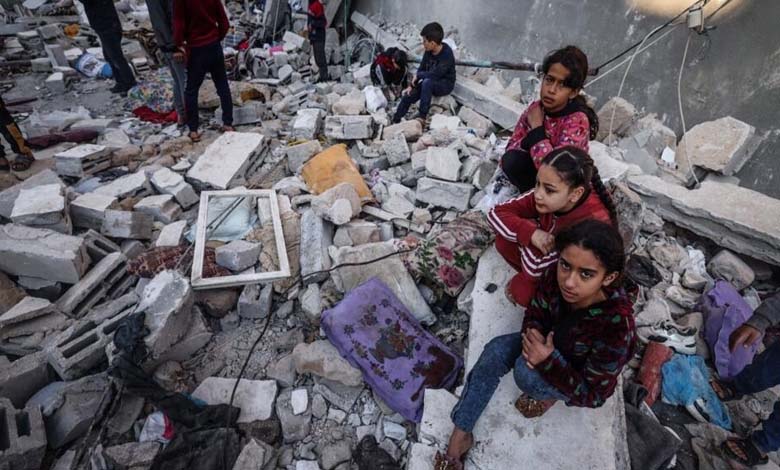Israel Sets Date to End “Gaza Incursion” and Outlines Next Phase

Amid the escalating exchange of shelling between Hezbollah and Israel, and Israel’s need for its forces for any potential war in the north, the Jewish state has set a date to end its ground war in Gaza.
The Israeli army says it needs a period of 4 weeks to end its ground operation in Rafah in southern Gaza Strip, in preparation for the transition to the third phase of the war.
With the war entering its third phase, the Israeli army will be reduced in the Gaza Strip, while maintaining its presence in the Netzarim corridor that divides the Gaza Strip and the Philadelphia axis at the border between Gaza and Egypt.
The decision was made during a discussion held on Sunday, with the participation of Israeli Prime Minister Benjamin Netanyahu, Defense Minister Yoav Gallant, and senior army officers in the southern command to move to the third phase.
The third phase is called “targeted bombing,” which means bombing Hamas sites from a distance.
The Israeli Broadcasting Corporation said on Tuesday: “The political level has allowed the army to gradually transition to the third phase of fighting in the Gaza Strip during this month.”
It added: “This step will be linked to progress in exchange deal negotiations and the situation on the border with Lebanon (..). The army plans to keep forces on the Philadelphia axis and the Netzarim corridor that divides the center of the Strip into two.”
Different Phase For its part, Haaretz newspaper said: “From now on, the direction is clearer: reducing forces in Gaza, moving to a system of raids on Hamas targets there, and transferring forces to the northern border.”
It added: “The main question will be how to include this development in the narrative that will convince the public that the government and the Israeli army have achieved a large part of the war’s objectives, even though Hamas has not been completely defeated and 120 hostages have not returned home.”
It added: “The Israeli army will continue to maintain forces in the Netzarim corridor, which separates north and south Gaza, and the Philadelphia corridor, which extends along the border with Egypt, but the operation in Rafah will soon be announced.”
It added: “One of the questions that has been raised is: which parts of the Philadelphia corridor should the Israeli army continue to control. For now, it seems that they will not leave the Rafah border crossing between Gaza and Egypt, due to issues in reaching an agreement with Egypt.”
It added: “The message that Defense Minister Yoav Gallant and Chief of Staff of the Israeli army Herzi Halevi seek to send is that the large-scale attack in Rafah completes the destruction of Hamas‘s military wing in its old form. The last regional battalions have been taken out of action.”
It added: “Hamas is still active, but it operates in a new form, based on cells and small guerrilla wars unable to cause much damage, and has almost no command or control structure.”
Mowing the Grass It added: “The army will be required to continue fighting Hamas, but this will be done according to the grass mowing method used in the West Bank – conducting repeated raids on Hamas targets, arresting militants and sending them to the Shin Bet for interrogation.”
For its part, Channel 12 news said: “The army has asked the political leadership for four more weeks to complete the operation in Rafah, meaning before the end of this July. This time window was necessary for the army to deal with the remaining tunnels in Rafah, but also the Philadelphia corridor, which the Israeli army had already controlled at the end of last May.”
It added: “Senior officials from the Israeli army and Shin Bet presented the progress made so far in the maneuver in Gaza to the Prime Minister and Defense Minister, and said that the military achievement is already high enough that if Israel had to stop the fighting – either due to a new hostage exchange deal or the possibility of an arrangement in the north – the army would already be able to do so.”
-
Leaks from the Secret Meeting: Iran Refuses to Support Hezbollah and its Iraqi Militias Against Israel
-
A “Complex Operation”: How Israel rescued four hostages from central Gaza
It added: “Even if intensive activity continues for another month, as the army wants, or stops due to the two mentioned options, the Israeli Defense Forces will not withdraw from the Gaza Strip, but will remain in two important tactical positions: the Netzarim corridor and the Rafah border crossing. The Netzarim corridor is actually a passage that crosses Gaza to the coast, a kind of perimeter that divides and splits the sector. By maintaining control of this road, the Gaza Strip will continue to be divided in a way that allows the army to better control the sector.”
-
Israel Was Aware of Hamas Attack Three Weeks Before Its Execution
-
Washington denies using floating dock in rescue of Israeli hostages and announces completion of aid deliveries
According to Channel 12 news, “the second focus where the forces will remain is the Rafah border crossing, which the Israeli army has controlled for two months. The crossing has been used for years by Hamas to smuggle large quantities of weapons, and after clearing the Philadelphia corridor, called Hamas‘s lifeline, Israel will be able to guard any attempt by Hamas to rehabilitate itself militarily.”












